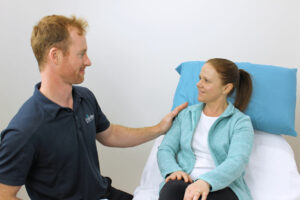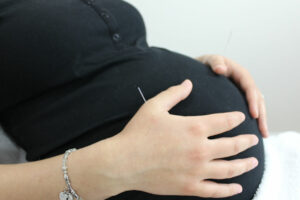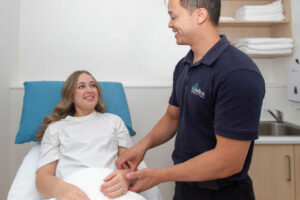Planning a family is one thing, but unfortunately for many couples, the arrival of their new bundle of joy can be a long and challenging journey presenting many highs and lows.
Infertility is a common condition impacting millions of couples all around the world. Infertility refers to when a couple have been unable to conceive after more than 12 months of unprotected sexual intercourse.
Did you know that one in six Australian couples of reproductive age experience fertility problems? This is staggering!
There is a saying “Cultivate the soil before you plant the seed”. Before planting a seed, you need to tend to the soil to create a healthy environment for the seed. The same could be said about fertility, giving your body all the nutrients and lifestyle requirements needed for an embryo to successfully implant and begin life.
Have You Been Trying to Conceive?
If you’ve been trying to conceive, there’s no doubt that there’s been a strain on your mental fitness (or mental health) such as stress, anxiety, sadness or anger. All of this culminates and can lead to you losing focus and concentration on what the future holds.
The emotional impact of infertility has been well documented so don’t think that you are alone.
When couples continue to be unsuccessful in conceiving, it eventually affects their self-esteem, sexual desire and performance. If sex becomes associated with failure and frustration due to fertility issues, the couple risks losing their physical and emotional connection.
There Is A Lot That You Can Do To Improve Fertility Naturally
On the upside of things, when you eventually succeed, falling pregnant can be a very exciting time for couples. For some, it’s being able to start your own family and for others, it means another addition to the growing family.
Trying to conceive can be a very exciting yet stressful time for couples. When you first realise that you’re experiencing fertility problems, the natural tendency is often to panic and stress out. The fact is, there are certain simple changes you can make to your lifestyle and environment that can provide a real boost to fertility, for both men and women.
So keep reading, because I’m about to share with you all my 8 Top Tips to Naturally Improve Fertility.
1. Get Familiar With Your Cycle
As a woman understanding your menstrual cycle as well as knowing when ovulation occurs is critical when trying to fall pregnant, as the window of opportunity is fairly small every month. When ovulation occurs, a mature egg from the female ovary is released which enables the egg to be fertilized by male sperm cells.
On average, most women have a 28-31 day menstrual cycle, but there can be some variation to this. Anything outside of this range or frequent irregularities should always be discussed with your healthcare professional.
You can’t get pregnant without ovulation. Tracking your monthly period is one way to get familiar with your body’s fertility window. There are phone applications that you can use such as FLO, Glow or Fertility Friend to help you keep track of your menstrual cycle and ovulation dates. There are also other tools you can utilize such as ovulation prediction kits and Basal Body Temperature (BBT) charting.
At the end of the day, understanding your fertile window and having frequent intercourse during this window will help increase your conception chances.
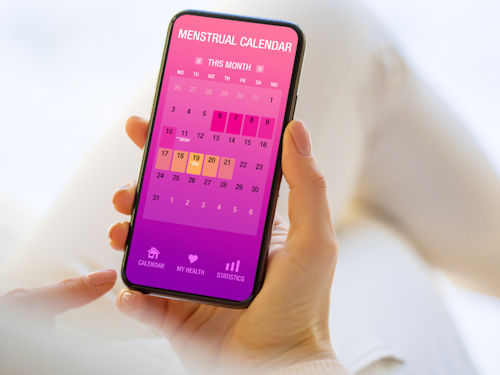
2. Maintaining a Healthy Diet and Weight
Now, it’s really important to note! When it comes to diet, the focus should be on lifestyle modification not specifically weight loss.
The reason for this is that women who are eating too little nutrient-dense foods may often see their periods disappear too – because the body does not feel it is in a safe place with adequate resources to conceive.
What we do recommend is focusing on fresh whole foods including fruit, vegetables, whole grains, foods high in antioxidants, fibre and folate, as well as proteins such as chicken, turkey and some red meats. It is also really important to consume healthy fats such as those found in almonds, avocados and different fish while limiting more well-known saturated and trans-fats found in most processed and packaged foods.
This isn’t to say we can’t enjoy our favourite chocolate bar or packet of chips, it’s about acknowledging what should be a sometimes food in our diet and prioritising more nourishing, fulfilling food choices more often for our bodies.
Maintaining a healthy body weight is also particularly important. Being overweight or underweight can actually have a significant impact on fertility. If you are underweight it can cause your body to stop making the hormone Oestrogen, which can cause irregular menstruation and hinder ovulation. While being slightly overweight can cause your body to make more estrogen which can interfere with menstruation time and prevent you from ovulating.
New research suggests the microbiome (the community of bacteria growing in the gut) may differ if you have conditions like endometriosis and PCOS, and that for both conditions some of the inflammation begins as a result of diet!
3. Avoid Smoking and Alcohol
Seems like an obvious tip right? However, it needs to be said that both of these lifestyle choices can have serious implications on our health and also our fertility.
Smoking can be a huge barrier to fertility. Not only has smoking been linked to poor conception rates and increased risk of miscarriage, but there is also a connection between smoking and poor sperm motility for men.
If a woman smokes, it can have a big impact on the reproductive process, including hormone production, egg maturation and embryo transportation. Women who smoke are also more likely to go through menopause at an earlier age
For men who smoke, this can adversely affect their sperm quantity and quality. This means that the sperm can appear abnormal and swim abnormally also. The long-term effects of smoking include damaged blood vessels, making it more likely for men to develop erectile problems and sexual dysfunctions.
In regards to alcohol and fertility health, the harmful effects of alcohol consumption on a developing embryo are well established.
However, there is still not a lot of information on just how much alcohol affects fertility and the chances of conception.
Research has shown that alcohol disrupts hormone levels and in particular, it decreases progesterone which may have an impact on the likelihood of conception. Women who drink large amounts of alcohol are more likely to have heavy or irregular periods which will affect fertility outcomes.
It’s also important to remember that it isn’t just female fertility that is affected by alcohol. Alcohol disrupts the normal balance of hormones in men, reducing levels of testosterone which has an impact to decrease sperm production and quantity.
4. Managing Stress
High stress levels can have a serious impact on your sex life and the biological functioning of the body, including reproductive functions. The release of stress hormones like cortisol can lead to physiological changes that impact your reproductive health. The symptoms of stress can be similar whether you’re feeling it because of fertility issues, life challenges or illnesses.
Managing stress through mindfulness techniques and exercises such as walking or activities that bring about a sense of relaxation can be incredibly powerful!
When you are already on an emotional rollercoaster with trying to conceive, it can be hard to imagine yourself being in a relaxed space, but it can make all the difference in improving fertility outcomes!

5. Excercise in Moderation
Another fairly obvious tip is exercise! Don’t underestimate the huge impact exercise has on our health and not just for weight management reasons!
Exercise is known to help decrease stress, increase, and stimulate endorphin production (our happy hormone!) and improve our body’s blood circulation just to name a few. As you can imagine these are all integral for our general well-being, however, they are just as important if not more, for fertility health!
Remember for successful conception it really does come down to both parents being in the best health state possible which does include exercising in moderation.
However, moderation really is the key. Excessive high-intensity exercise has been associated with decreased fertility as it may change the energy balance in the body and negatively impact the reproductive system!
6. Prenatal Supplements
There are a number of vitamins and minerals that are important for individuals who are trying to conceive. Supplementation with these vitamins and minerals can play a vital role in female health as they are essential for several functions like:
- Menstruation
- Ovulation
- Thyroid
- Immunity
- Energy Production
- Egg Quality
Supplementation with quality pre-natal supplements is also a highly effective method for male health to improve fertility outcomes and they can have an effect to:
- Improve sperm count
- Improve sperm quality(shape and motility)
- Improve energy levels and sexual desire and libido
The best way for an individual to get most of the vitamins and minerals they need is by eating a healthy well-balanced diet. For most people, however, it’s a very convenient and effective step to supplement their diet with a quality prenatal supplement.
Our Top Recommendation
For women, we recommend Pregnancy Care Advanced and for men we recommend Paternal Plus simply because these are prenatal supplements that have high quantities of highly bio-available ingredients that have been shown in significant studies to be beneficial in improving fertility outcomes.
7. Getting Adequate Sleep
Who doesn’t love sleep?
Did you know that 40% of Australians struggle to sleep for 7-9 hours a night and over 50% experience symptoms of having trouble sleeping at least 3-4 times a week which can include trouble falling asleep, staying asleep or waking up too early and finding it hard to fall back asleep.
The quality and quantity of your sleep affects your fertility. Sleeping helps us fight infections, boosts our metabolism and lowers the risk of developing illnesses such as high blood pressure and diabetes. Consistent lack of sleep may impact fertility by disrupting the part of the brain that regulates cortisol (stress hormone) and melatonin (sleep hormone) also controls the release of reproductive hormones.
Sleep deprivation signals the body to produce more stress hormones, which is bad for overall health and can throw off levels of estrogen, testosterone and other reproductive hormones, all of which are integral to fertility health. Where possible:
- Be consistent with your sleep routine, try to go to bed at the same time each night
- Turn off electronic devices 2 hours prior to going to sleep, even reading a book before bed
- Keep your bedroom as dark as possible, darkness helps to stimulate the production of melatonin which massively impacts sleep quality!
- Stay away from caffeine in the late afternoons, instead opt for herbal tea or other types of drinks or find another routine to keep you mentally alert.
8. Professional Services
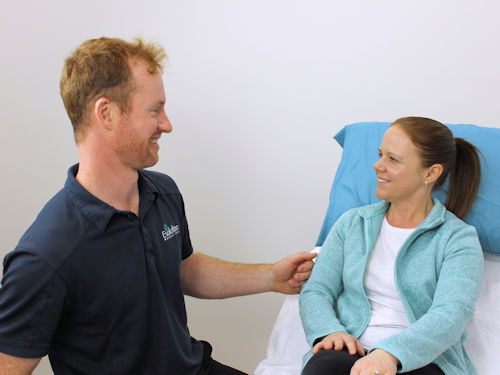
No doubt that if you have been trying for over 12 months, there would be high levels of stress among other symptoms that you have been experiencing.
Infertility is still a relatively silent topic with many couples preferring not to openly discuss their difficulties when trying for a baby. As a result, many couples think that once they speak to a specialist they would automatically go down the IVF route.
But there are many conventional and alternative therapies that can help with your journey of improving fertility and falling pregnant!
Remember There Is So Much You Can Do!
Trying to conceive can be a stressful time if it is taking longer than you had planned. Incorporating some of the above ideas into your daily routine is a simple and very effective way to do something positive to improve your health and therefore fertility chances.
Have You Been Experiencing Challenges With Fertility?
In order to achieve the best outcomes for your health, as always, we recommend speaking to a healthcare professional.
In many cases, there may be multiple factors contributing to infertility and your healthcare professional is the best person to effectively assess and advise the most appropriate course of action for your situation.
Let us help you with your fertility health! Get in touch with our team on (02) 4709 6727 or by booking online yourself!



